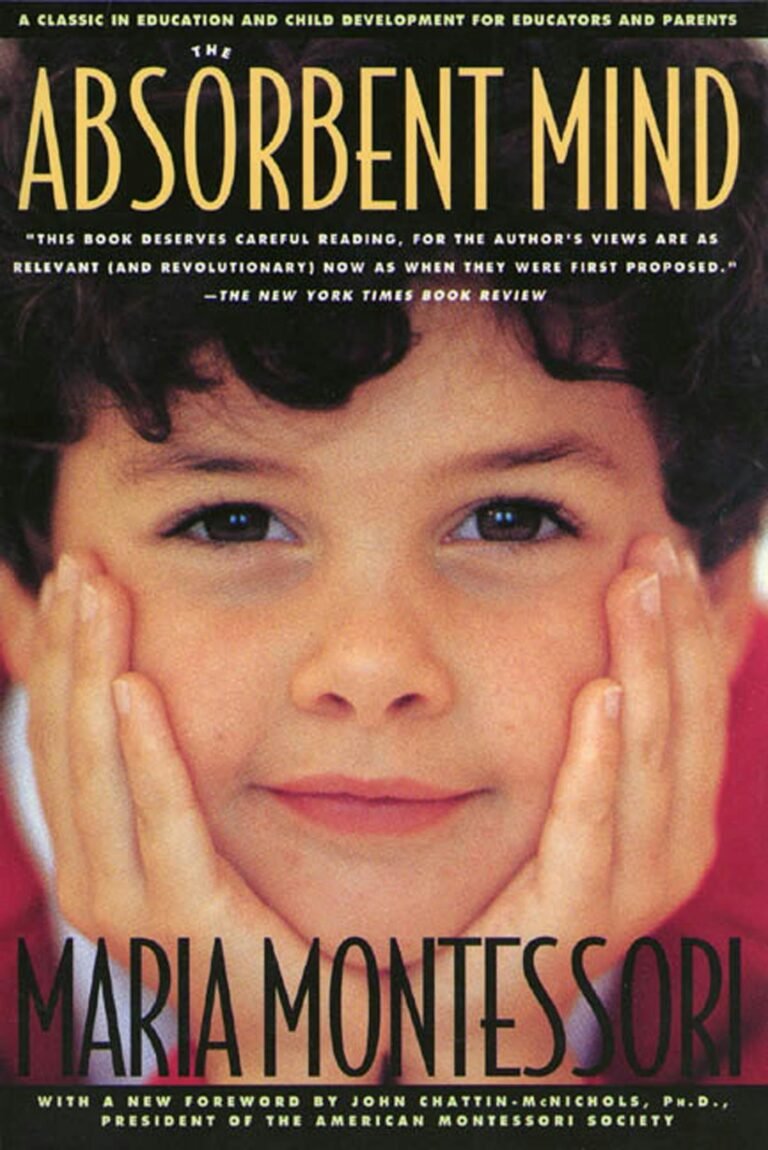
Dr. Maria Montessori’s groundbreaking book, The Absorbent Mind, remains a cornerstone of early childhood education and developmental psychology. It offers profound insights into how young children absorb and process the world around them. Montessori’s observations and philosophies continue to inspire educators, parents, and researchers by emphasizing the unique capacities of the developing mind and the pivotal role of early childhood experiences. This article delves into the book’s key concepts, highlighting its relevance to modern education and parenting practices.
Understanding the Absorbent Mind
Dr. Montessori’s central concept in the book is the absorbent mind, a term she coined to describe the incredible ability of children, especially during their first six years, to unconsciously and effortlessly take in information from their surroundings. According to Montessori, this period is divided into two phases:
- The Unconscious Absorbent Mind (0–3 years): In this phase, the child learns passively, soaking up stimuli from the environment without conscious effort. Language, movement, and cultural norms are acquired naturally as the child interacts with their surroundings. Montessori likened this phase to a camera capturing impressions of the world.
- The Conscious Absorbent Mind (3–6 years): During this period, children become more aware of their actions and begin to process and apply the knowledge they have absorbed. Their curiosity blossoms as they start asking questions and engaging with the world in purposeful ways. This is also the stage where Montessori believed education should actively guide children’s development.
The Role of the Environment in Early Childhood
Montessori emphasized the critical influence of the environment on a child’s development. She argued that children absorb not just knowledge but also emotions, behaviors, and cultural values from their surroundings. The environment, therefore, must be carefully designed to support their natural curiosity and development. Key elements of an optimal early childhood environment include:
- Order and Structure: Children thrive in environments that are predictable and organized. Order helps them make sense of their world, aiding in the development of logical thinking and emotional stability.
- Freedom of Exploration: Montessori highlighted the importance of allowing children to move freely and explore their surroundings. This freedom fosters independence, confidence, and creativity.
- Respect for the Child: Adults must respect children’s individuality and provide opportunities for self-directed learning. Montessori viewed children as active participants in their own development rather than passive recipients of knowledge.
The Sensitive Periods
One of Montessori’s most influential contributions to early childhood education is the concept of sensitive periods. These are windows of heightened receptivity to specific types of learning. During these phases, children are naturally drawn to particular activities or skills, such as language acquisition or sensory exploration. Key sensitive periods include:
- Language Development (0–6 years): Language acquisition is one of the most remarkable achievements of early childhood. Montessori observed that children effortlessly learn to speak, read, and write when provided with a language-rich environment.
- Order (0–3 years): Young children exhibit a strong need for order and routine. They find comfort in consistency, which helps them develop a sense of security and understanding of their environment.
- Movement (0–4 years): Physical activity is closely linked to cognitive development. Montessori stressed the importance of allowing children to refine their motor skills through purposeful movement.
- Social Interactions (2.5–6 years): Children become increasingly interested in social relationships, learning to communicate, collaborate, and empathize with others.
Recognizing and supporting these sensitive periods can significantly enhance a child’s development.
The Montessori Approach to Early Childhood Education
The Absorbent Mind lays the foundation for the Montessori method of education, which is child-centered and tailored to the natural developmental stages of learning. Key principles include:
- Hands-On Learning: Montessori classrooms are equipped with materials that encourage sensory exploration and active engagement. For instance, children might use tactile materials to learn mathematical concepts or letters.
- Self-Directed Activity: Children are given the freedom to choose activities that interest them, fostering intrinsic motivation and a love for learning.
- Mixed-Age Classrooms: Montessori believed that mixed-age groups encourage peer learning and collaboration. Younger children learn from observing older peers, while older children reinforce their knowledge by teaching younger ones.
- Prepared Environment: The classroom is meticulously designed to support independence and curiosity, with materials and activities organized to meet the developmental needs of each child.
The Spiritual Embryo and Human Potential
Montessori introduced the idea of the spiritual embryo, which refers to the child’s innate potential and inner drive to develop into a fully realized human being. She viewed education as a process of nurturing this potential rather than imposing knowledge from the outside.
Key aspects of the spiritual embryo include:
- Innate Curiosity: Children possess a natural desire to explore and understand their world.
- Love of Learning: Montessori believed that children are born with an inherent passion for learning, which must be protected and nurtured.
- Moral Development: Early childhood is also a critical period for forming values, empathy, and a sense of justice. Montessori stressed the importance of modeling kindness and respect.
The Role of the Adult
In The Absorbent Mind, Montessori redefines the role of the adult in early childhood education. Adults are not merely instructors but guides and observers. Their responsibilities include:
- Facilitating Independence: Adults should create opportunities for children to do things for themselves, building confidence and self-reliance.
- Providing Guidance Without Interference: Montessori advised adults to offer support when needed but to step back when children are capable of managing tasks independently.
- Observing and Adapting: Observation is a cornerstone of the Montessori method. By carefully watching children, adults can identify their interests, needs, and sensitive periods, adjusting the environment accordingly.
Implications for Early Childhood Education Today
Dr. Montessori’s insights from The Absorbent Mind remain profoundly relevant in contemporary education. Modern research supports her observations on early brain development, emphasizing the importance of rich, responsive, and nurturing environments during the first six years of life.
Some practical takeaways for parents and educators include:
- Encouraging Exploration: Allow children to engage in unstructured play and hands-on activities to foster creativity and problem-solving skills.
- Prioritizing Relationships: Emotional security and strong bonds with caregivers are foundational for healthy development.
- Minimizing Distractions: Avoid overstimulation and excessive screen time, which can hinder focus and learning.
Conclusion
The Absorbent Mind is not just a book about education; it is a call to recognize and honor the immense potential of early childhood. Dr. Maria Montessori’s visionary insights underscore the importance of nurturing the absorbent mind during its most formative years. By creating environments that respect children’s natural development, we can empower them to become independent, compassionate, and lifelong learners.
In today’s fast-paced world, where early education is often driven by rigid standards and external pressures, Montessori’s philosophy offers a refreshing and humanistic approach. Her timeless wisdom reminds us that the foundation for a fulfilled and successful life begins in early childhood, with an absorbent mind ready to embrace the wonders of the world.
Let’s Keep the Growth Going
You’ve come this far for a reason. Stay connected and receive insights that meet you where you are—right in your inbox.
- Join our Newsletter -
Share:
Categories
- A Course in Miracles - Weekly Study Guide 2
- Ancient Wisdom 14
- Book Summaries 20
- Coach G's Journal 54
- Conscious Motherhood 7
- Conscious Pregnancy 2
- Conscious Women 30
- Gloria’s Journal 6
- Life Coaching 80
- Marriage & Relationship 20
- Parenting 5
- Productivity 11
- Quantum Psychology 73
- Self-Improvement 101
- Spirituality 55
- Top Business Coaching Strategies 9
Popular Posts
No Blessing Can Be Cursed: How To Be the Miracle You’re Searching For
Alcohol – The Spirit You Cannot Master
Tags
Useful Links
Quick Menu
Contact Us
- +971585541780
- info@coach-g.com
- Al Murjan tower, Al Marsa Street Dubai Marina
© 2025 COACH G.




